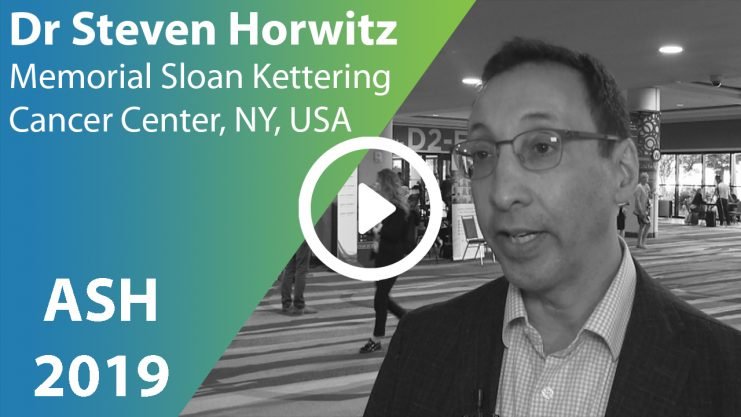Advertisment
Experts explore questions in peripheral T cell lymphoma

Dr Steven Horwitz (New York, USA) discusses new directions for treating PTCL.
Written by Thomas R. Collins.
In the wake of results from the ECHELON-2 trial earlier this year, brentuximab vedotin plus the CHP (cyclophosphamide, doxorubicin, prednisone) chemotherapy regimen should be the top front-line choice for anaplastic large cell lymphoma (ALCL), the principal investigator of the trial said in a symposium here in advance of the American Society of Hematology annual meeting. But questions remain about other subgroups.
ECHELON-2 was the first trial to produce data showing a statistically conclusive benefit over CHOP (cyclophosphamide, doxorubicin, vincristine, prednisone), after many other trials failed to do so. It enrolled newly diagnosed peripheral T cell lymphoma patients — 75% of whom were ALCL patients so that this group could be evaluated independently. Those with subtypes that were not ALCL had to have at least 10% CD30-positive T cells.
The 3-year progression-free survival (PFS) was 57% in the BV-CHOP arm compared to 44% in the CHOP alone arm — with BV-CHP superior even though the results with the CHOP alone regimen were better than what would have been expected based on historical results, said Steven Horwitz, MD, a medical oncologist at the Memorial Sloan Kettering Cancer Center. The addition of BV more than doubled the amount of progression-free survival time.
“I would argue it’s the standard for anaplastic large cell lymphoma and a standard for the other subtypes,” Dr. Horwitz said.
The trial included intermediate- and high-risk ALK-positive patients, who saw benefit. But a question remaining after this heralded trial is what to do with ALK-negative patients, he said.
“It didn’t include ALK-negative patients,” he said. “In my view, it would probably be a little bit academic to not give brentuximab when there’s no increased toxicity and a survival benefit to a low risk ALK-positive patient, because they (ALK-negative patients) weren’t included…. My bias would be you can include it for all patients with ALCL, ALK-positive or ALK-negative.”
Consolidation also wasn’t addressed in the trial, but considering the impressive results in ALK-positive patients — with only 5 instances of progression seen in 49 patients in this group — autologous stem cell transplant is likely not needed, Dr. Horwitz said, since it would be so difficult to improve upon those results.
With ALK-negative patients, he said, “pending more data, I usually still do it. That’s still my practice.”
With research ongoing, he said, “we may be able to identify another group of ALK-negative ALCL patients that does just fine with BV-CHP alone.”
Barbara Pro, MD, professor of medicine at Northwestern University’s Feinberg School of Medicine, underscored the need for better therapies in the relapsed and refractory setting for non-ALCL subtypes of peripheral T cell lymphoma.
Romidepsin and belinostat, two HDAC-inhibitors have produced objective response rates (ORR) that leave room for improvement — about a quarter of patients had a response — but, Dr. Pro said, “some of the responses were actually long-lasting.”
Belinostat has produced big differences in ORR for PTCL that’s not otherwise specified — 23% — compared to angioimmunoblastic T cell lymphoma (AITL) — at 46%.
Going forward, to produce better results in these subtypes that are prone to relapse, trials need to evaluate new combinations that are driven by targets and biology, and not merely by histology, she said.
Pointing to the small subgroups in current trials, she said, researchers “need to enrich clinical trials for rare subtypes.”
1) Horwitz S, O’Connor OA, Pro B, et al. Brentuximab vedotin with chemotherapy for CD30-positive peripheral T-cell lymphoma (ECHELON-2): a global, double-blind, randomised, phase 3 trial. Lancet. 2019 Jan 19;393(10168):229-240.
2) O’Connor OA, Horwitz S, Masszi T, et al. Belinostat in Patients with Relapsed or Refractory Peripheral T-Cell Lymphoma: Results of the Pivotal Phase II BELIEF (CLN-19) Study. J Clin Oncol. 2015 Aug 10;33(23):2492-9.
3) Pro B, Horwitz SM, Prince HM, et al. Romidepsin induces durable responses in patients with relapsed or refractory angioi





